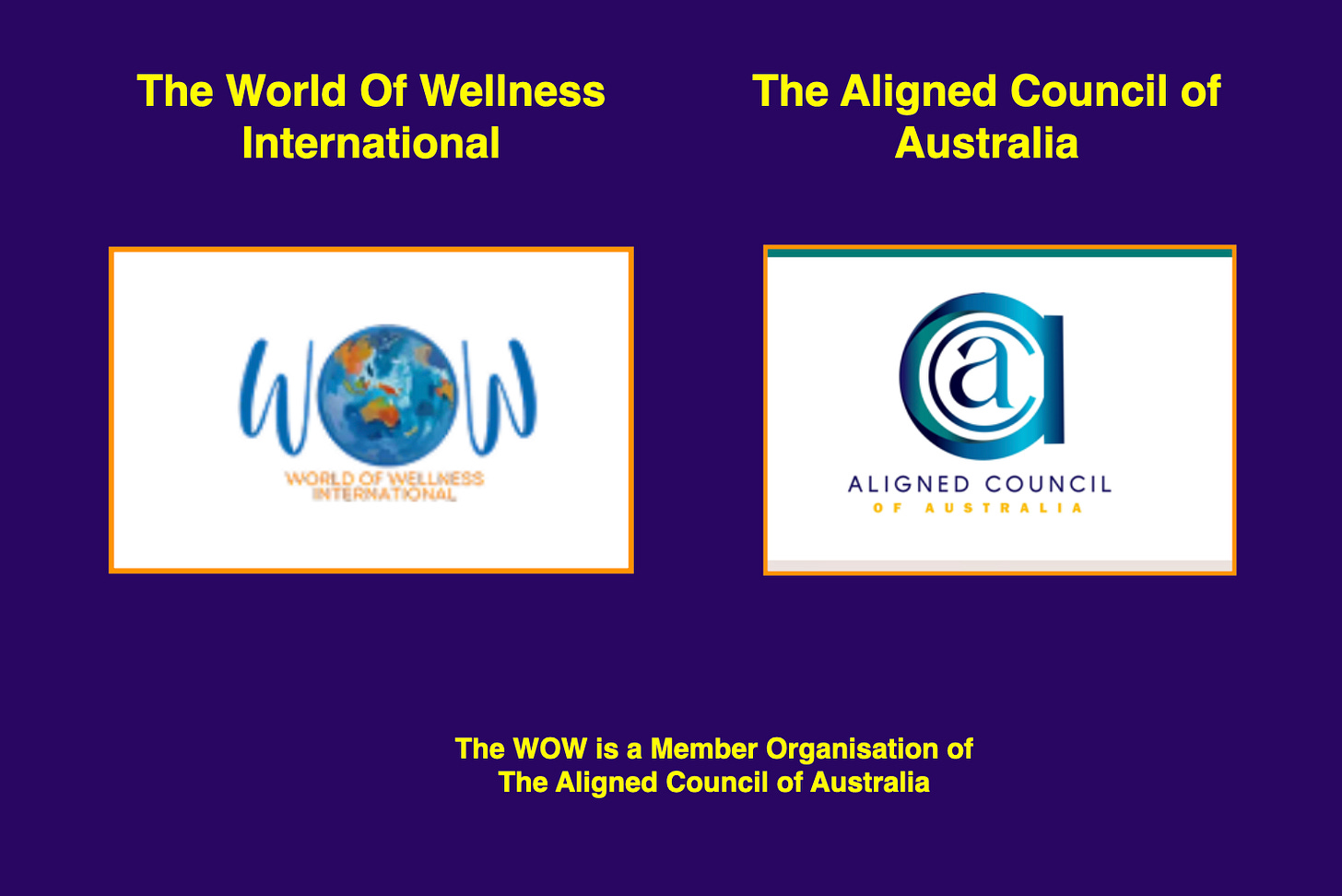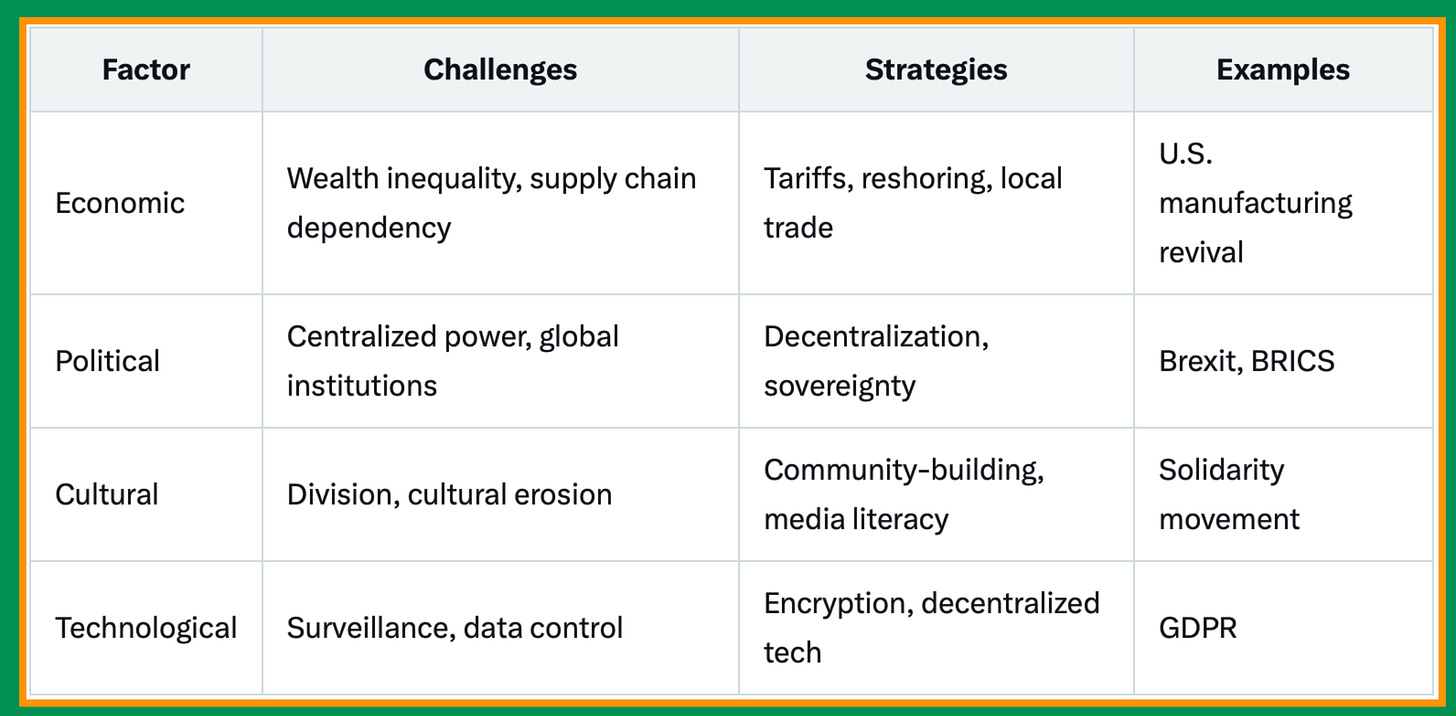Do You Want to be Free? Defeating the creeping of globalisation and totalitarianism.
My plea to friends, colleagues and all the people of Australia who want to have the best of life. With a message from one of our few enlightened, honest and courageous politicians, Pauline Hanson.
Ian Brighthope……….click above for my thoughts.
The WOW-The World of Wellness TheAligned Council Of Australia
Please consider joining one or both of these organisations or any of the other 38 member organisation of The Aligned Council Of Australia.
“Freedom is never guaranteed — it lives or dies with the choices of each generation. In an age of digital surveillance, global overreach, and creeping authoritarianism, it must be actively defended, fiercely protected, and consciously passed on — or it will vanish before our eyes.”
Ian Brighthope……….my feelings
“In Australia, freedom has proven to be more fragile than we imagined. During the pandemic, it wasn’t a foreign invader that threatened it — it was our own institutions. Sweeping emergency powers, censorship of dissent, forced medical interventions, and the silencing of doctors showed us how quickly liberty can be suspended in the name of so-called ‘health.’ Freedom is never more than one policy cycle from extinction. It must be questioned, defended, and handed on — or it will not survive the next ‘crisis.’”
Ian Brighthope
Defeating Globalisation and Totalitarianism.
Factors, Feasibility, and Practical Steps to Begin.
Introduction
Globalisation and totalitarianism are often seen as intertwined forces that threaten individual liberties, national sovereignty, and local communities. Globalisation, characterised by the integration of economies, cultures, and societies through trade, technology, and migration, has been driven by neoliberal policies favouring multinational corporations and supranational institutions like the World Trade Organisation (WTO) and International Monetary Fund (IMF). Totalitarianism, defined by centralised control, suppression of dissent, and pervasive surveillance, consolidates power in the hands of a few, often exploiting global systems to enforce compliance. Critics argue that globalisation enables totalitarianism by creating economic vulnerabilities and cultural homogenisation, which authoritarian regimes or global elites can manipulate to impose control. Defeating these forces requires addressing their economic, political, cultural, technological, and social roots. Is it possible? Yes, but it demands coordinated, persistent efforts across multiple fronts. Historical examples, like the fall of the Soviet Union or resistance to global trade agreements, show that change is achievable.
Is It Possible to Defeat Globalisation and Totalitarianism?
Defeating globalisation and totalitarianism is feasible but complex. History offers evidence of success: the Soviet Union's collapse in 1991 showed that totalitarian regimes can fall due to internal dissent, economic failure, and external pressures, often without widespread violence. Similarly, the anti-globalisation movement of the late 1990s, including protests against the WTO in Seattle (1999), forced policymakers to reconsider unchecked free trade, leading to fair trade initiatives. More recently, Brexit (2016) and protectionist policies in the U.S. (2017–2021) signal a "deglobalisation" trend, with nations prioritising sovereignty and local economies. The COVID-19 pandemic further exposed global supply chain fragilities, prompting calls for reshoring and self-reliance.
However, challenges persist. Totalitarian systems adapt, using technologies like AI-driven surveillance (e.g., China's social credit system) to entrench control. Globalisation evolves through digital economies and "green" initiatives that maintain elite influence. Success requires addressing root causes—inequality, cultural erosion, and centralised power—while leveraging growing public skepticism toward global institutions, as seen in populist movements worldwide.
Key Factors to Consider
To dismantle globalisation and totalitarianism, several interconnected factors must be addressed. Below is an analysis of these dimensions, supported by historical and contemporary evidence.
1. Economic Factors
Reshoring and Protectionism:
Globalisation's reliance on offshoring has led to job losses and wage suppression in developed nations, fueling inequality. Counter this by implementing tariffs, subsidising domestic industries, and decoupling from exploitative economies. For example, U.S. policies post-2020 aimed at reshoring manufacturing reduced dependency on Chinese supply chains, boosting local economies.
Reducing Inequality:
Globalisation concentrates wealth among elites, creating social unrest that totalitarians exploit. Progressive taxation, worker cooperatives, or alternative economic models like mutual aid can redistribute resources, weakening the grip of global corporations. Studies show inequality drives support for authoritarian "solutions," making this critical.
Local Economies:
Promote community-based systems like local trade networks or cooperative businesses to reduce reliance on global markets. The "buy local" movement in the U.S. and Europe demonstrates how small-scale economies can thrive, countering globalisation's environmental and social costs, such as pollution and cultural isolation.
2. Political Factors
Decentralisation:
Totalitarianism thrives on centralised power. Devolving authority to local governments through referendums or regional autonomy can undermine this. Brexit exemplified how national sovereignty can be reclaimed from supranational entities like the EU.
Challenging Global Institutions:
Organisations like the WEF, WHO, or UN often push policies that undermine sovereignty. Strategies include withdrawing from such frameworks or forming alliances of sovereign nations, as seen in groups like the BRICS bloc, which prioritise national interests over global mandates.
Resisting Authoritarian Mechanisms:
Prevent the adoption of tools like digital IDs, central bank digital currencies (CBDCs), or emergency powers that enable surveillance and control. Public pushback against COVID-19 vaccine passports in several countries (e.g., Canada, 2021–2022) shows resistance can work.
3. Cultural and Social Factors
Fostering Community and Empathy:
Totalitarianism divides through fear and dehumanistion. Building strong, empathetic communities through local initiatives, education, and cultural preservation counters this. Poland’s Solidarity movement in the 1980s used community solidarity to erode communist control.
Countering Propaganda:
Global media and tech giants align with globalist and authoritarian narratives. Promote media literacy, transparency, and independent journalism to combat misinformation. Avoid censorship, which mirrors totalitarian tactics, as seen in debates over social media moderation.
Moral and Spiritual Resistance:
Ethical protest, community values, or even spiritual practices can sustain resistance. Non-violent movements like India’s independence struggle under Gandhi illustrate the power of moral conviction against oppressive systems.
4. Technological and Geopolitical Factors
Securing Technology:
Globalisation and totalitarianism leverage technology for control, from surveillance to data exploitation. Promote decentralised tech, encryption, and open-source platforms to protect privacy. Europe’s GDPR laws are a step toward curbing data monopolies.
Geopolitical Alliances:
Form coalitions of nations resisting globalist or authoritarian models. Decoupling from economies tied to totalitarianism, like China’s, reduces leverage for control. The U.S.-India trade alignment post-2020 exemplifies this shift.
Reframing Environmental and Health Narratives:
Globalisation often uses crises like pandemics or climate change to justify control. Advocate for localised solutions, like community-led conservation or national health policies, to avoid top-down mandates.
How to Start: Practical Steps
Educate and Raise Awareness:
Begin by understanding the mechanisms of globalisation and totalitarianism. Use independent media, books, and discussions to educate others. Platforms like X can amplify voices critical of globalist policies, but verify sources to avoid misinformation.
Organise Locally:
Form community groups to promote local economies, mutual aid, or cultural preservation. Examples include farmers’ markets or neighbourhood defence networks, which reduce reliance on global systems.
Engage in Peaceful Activism:
Organise protests, petitions, or campaigns against policies like digital IDs or trade agreements. The Canadian trucker protests (2022) showed how collective action can challenge authoritarian measures.
Build Parallel Systems:
Create alternative institutions, such as local cooperatives or independent schools, to bypass globalised structures. Historical examples include dissident networks in Soviet-era Eastern Europe.
Form Strategic Alliances:
Collaborate across ideologies—libertarians, nationalists, or localists—focusing on shared goals like sovereignty. Avoid divisive traps set by globalist narratives.
Reduce Digital Dependency:
Limit reliance on social media platforms that promote division or surveillance. Prioritise face-to-face interaction and secure communication tools.
Support Policy Change:
Vote for candidates or policies promoting decentralisation, protectionism, and privacy. Engage in advocacy through donations or volunteering.
Defeating globalisation and totalitarianism is a daunting but achievable goal. By addressing economic dependency, political centralisation, cultural erosion, and technological control, individuals and communities can reclaim autonomy. Start small—educate, organise, and act locally—while aligning with broader movements for sovereignty and freedom. The alternative is acquiescence to systems that prioritise control over liberty.
With persistence and unity, change is not just possible but already underway.




Thankyou Proffessor Brighthope for speaking and fighting for us all.
A real Aussie legend🙏
Every country today appears to be facing similar trials, its not over yet for America. I am waiting to see what the new ACIP advisory Committee of the HHS(Department of Health and Human Services) does in regard to placing a moratorium on the Covid-19 mRNA 'vaxxes.' Every day multitudes of people worldwide are injured and dead, because of this murderous injection. How many more victims will it take before our own American government calls a halt to this? Health is of major importance. The Medical Industry promoting and making money from these vile vaxes has no connection to the word health..